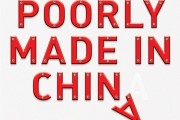The economic development and reforms initiated in the 1970s have remodeled China and “manufactured its way to prosperity”. Decades of fast economic growth have impacted people´s lives and challenged traditional ways of thinking. The Chinese were encouraged “to take a plunge into the sea” (下海 xiàhǎi) or, in other words, to give up their secured jobs to either enter the private sector or set up their own small businesses. The maxim “eating in the same pot” (吃大锅饭 chī dàguōfàn) that meant that “everyone will be rewarded equally regardless of their work” has been replaced by the formula “to be paid according to one´s labor” (按劳计酬 ān láo jìchóu). Local companies have become more competitive while China´s tremendous economic growth and potential continues to attract foreign multinationals as well as small and medium-sized companies eager to win new market share.
Since the launch of the reforms, a rapid urbanization has been changing the country´s landscape as millions of people move to large and mega cities alike, such as Beijing (21 millions), Shanghai (16 million) and Chengdu (14 million). Today, China has a population of over 1.3 billion with 50 percent being urban residents. This evolution, coupled with other factors such as the One Child Policy, an emerging middle class claiming its identity, an aging population, and the introduction of the internet in the 90s, have transformed the society.
China is now the number one country in the world in not only internet use and mobile phones but also ecommerce. The Boston Consulting Group (BCG) has estimated that the number of internet users in China will reach 700 million in 2015, and will include not only young and urban individuals but also seniors and rural residents. Chinese netizens for their part have developed a digital popular culture that is part of their “connected” lifestyle, and spend around 1.9 billion hours a day on the web for online shopping (as calculated in 2011 by BCG).
The Chinese digital world is a remarkable source of information to decode China. Netizens regularly create neologisms, buzzwords, and catchphrases that provide a unique inside perspective into their society and their everyday concerns. For example, they have imagined modern-day “tribes” to depict categories of individuals with common characteristics. These descriptions are witty and amusing but, above all, they reveal with accuracy people´s ordinary lives. Netizens portray struggling employees dreaming of becoming homeowners; workers (called 跳族, tiào zú, “flea tribe”) looking for higher wages; people concerned with environmental issues and food security; consumers buying genuine luxury brands as a symbol of their social status; couples of one child families committed to fulfill their duties towards their parents…
As Chinese creativity takes its root in a long tradition, netizens have conceived interesting plays on words for some of these “tribes”. For instance, “Overseas Returnees” (海归 hǎiguī) that include individuals who returned to China after studying abroad are nicknamed “Sea Turtles” (海龟 hǎiguī); The “rice-bowl test taking” tribe (考碗族 kǎowǎn zú) represents those preparing for civil service entrance exams as they aspire for a permanent job called an “iron rice bowl” (铁饭碗 tiěfànwǎn); the “perfect” man (高富帅 gāo fù shuài), is a newly created term made up of the characters for “tall” (高 gāo), “rich” (富 fù) and “handsome” (帅 shuài)….

The “iron rice bowl” of civil service.
Those “tribes” are shaping modern China and demonstrate the diversity of the new generations. Reports and articles are published on various “tribes”, particularly the notorious (ex. “Sea Turtles”, “Ant Tribe”, “Leftover Women”….), TV series are produced (ex. My Economical Man), videos explain key new words (土豪 tǔ háo), with some even being added to official dictionaries (ex. 房奴 fángnú, “mortgage slave”).
From a cultural perspective, this digital world is all the more fascinating in that it helps to initiate oneself into the “Chinese mind” and to capture the spirit of modern times. From a professional perspective, it is a unique source of information to analyze the needs of potential consumers and to be competitive in a country that is now turning to its domestic consumer market to drive its economy. The digital world is highly inspirational for the companies that want, among others, to identify promising niches, create a dialogue with their target audience to boost sales, and design an efficient costumer service while maintaining their reputation.
 Véronique Michel is a multilingual conference speaker and has published books in France on Chinese communication style (la communication à la chinoise). Her latest book, CHINA ONLINE (original version is LA CHINE BRANCHEE), has just been published in the US in English. She can be reached at [email protected].
Véronique Michel is a multilingual conference speaker and has published books in France on Chinese communication style (la communication à la chinoise). Her latest book, CHINA ONLINE (original version is LA CHINE BRANCHEE), has just been published in the US in English. She can be reached at [email protected].











